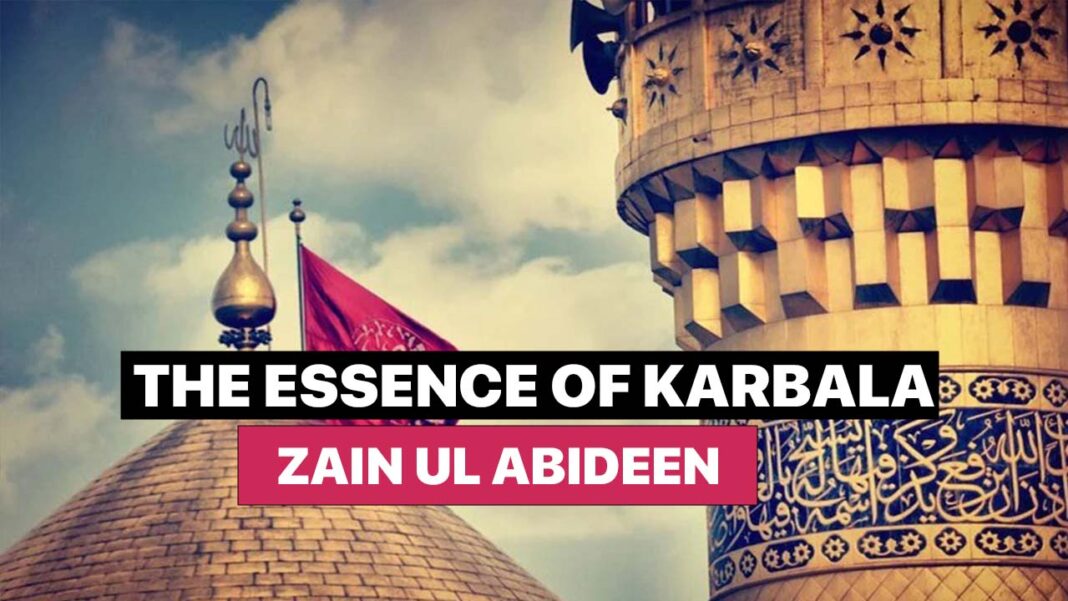Beyond rituals, Karbala is a living symbol that has motivated humanity for 14 centuries to transcend mediocrity, materialism, and self-centeredness in pursuit of the lofty peaks of truth and sacrifice. This term is synonymous with chivalry and serves as a moral and ethical standard. And the individual around whom all of these sublime virtues and qualities revolve is Hussain bin Ali.
In this era of moral bankruptcy and excess, where empty rituals masquerading as religion and rampant, selfish materialism are increasingly competing to gain partisans, Karbala stands out as a beacon, a revolutionary ideology that has the potential to transform society and alter human behavior. Khwaja Moinuddin Chishty, the sage of the subcontinent, was entirely correct when he declared, Hussain is the faith.
Every one of us has heard the Imam’s virtues at various forums. For instance, our rulers consistently issue statements on Ashura that express their sadness regarding the Imam’s situation and pledge their support for his noble cause. However, our nation would be significantly more prosperous if they were even marginally sincere about following in Hussain’s footsteps. Only a small number of us make an effort to transcend the weeping and mourning rituals and explore the boundless ocean of ma’arifat that is Karbala.
As the tradition Kullu yawmin Ashura wa kullu ardin Karbala (every day is Ashura and every land is Karbala) emphasizes, the message of Karbala is eternal and not constrained by time and space. This is not restricted to any specific sect, race, or creed. Universality is its hallmark. Insaan ko bedaar to ho lene do, har qaum pukare gi hamare hain Hussain, as Josh Malihabadi aptly phrased it. (“Let humanity awaken; all nations will proclaim, ‘Hussain is ours.'”). A magnificent substance that has the capacity to awaken humanity from its petrified slumber is contained within the appellation of the Imam. Gold can be transformed from lead by the alchemical power of Karbala.
On the day of Ashura in 61AH, two distinct philosophies emerged: Hussainiat and Yazidiat. Additionally, a third characteristic appeared: the spineless Kufis. Yazids of the present day continue to disseminate the philosophy of Yazidiat, which is characterized by arrogance, tyranny, amorality, and naked ambition, albeit under different identities and with different appearances. In the present day, Yazidiat manifests in a variety of ways, including terrorism, global neo-imperialism, financial inequality, and oppressive regimes. The Hussaini revolution must persist in its campaign against oppression of all forms, as the Imam did 1,400 years ago when he unmasked and challenged Yazidiat.
It is imperative to acknowledge the elements of Hussainiat and to employ them to cure the spiritual and ethical illness known as Yazidiat. The Imam’s message is eloquently conveyed across the vastness of space and time: oppose the oppressor and support the oppressed. This is skillfully conveyed in a sermon delivered by the Imam, as cited in Maulana Abul Kalam Azad’s The Martyrdom of Hussain: You observe the current situation. The world has undergone a transformation in its hue. It is entirely destitute of virtue. Is it not evident that the truth has been relegated to the background? Falsehood is being intentionally implemented. It is imperative that a believer endeavor to defend the truth in the name of Allah. Living with oppressors is a criminal offense in and of itself.
Hearts are consoled by tears for the martyrs of Karbala; however, they are inadequate. The twin teachings of knowledge and action are imparted by Karbala. The dynamic force that has sustained the Karbala revolution throughout the ages is Azadari, or lament for the Imam and his companions. There is no way to restrict it to rituals, and it cannot be eradicated through terrorism. It imbues the Hussaini character in all who are informed of and moved by the Imam’s struggle. As esteemed scholars have stated, azadari represents the development of character: a person of commonplace character should emerge from a majlis with a new self-image. It would be unjust to discuss the advantages of azadari without acknowledging the primary exponent of the Hussaini revolution and the movement’s propelling force: Zainab bint Ali. The women and children of the Ahlul Bayt were gathered by this courageous lady of the Prophet’s household (PBUH) after all of the male adults in the house, with the exception of Imam Ali bin Al Hussain Zain Al Abidin, were martyred at Karbala.
In spite of all odds, this honorable woman spoke fearlessly, reflecting the eloquence of her great father and shaking the court of Yazid with her defense of the Ahlul Bayt. Syeda Zainab has our eternal gratitude for keeping the truth of Karbala and stopping the historical wrong from being twisted.
Syeda Zainab delivered epochal addresses from Damascus to Karbala, and it is beyond the scope of this writer to assess their impact and delivery. It is safe to conclude that following the martyrs’ deaths at Karbala, Syeda Zainab began her own jihad with her powerful remarks. The speech this honorable woman gave before Yazid’s court exemplifies her faith and bravery: Oh Yazid! We trust Allah and present our case to Him in His court. Even though you try to persuade us to stray from our moral course by your lies and persecution, we will not. Our message and divine mission are indestructible, and neither are you; you will never be able to erase our name off the face of the earth.
Writer is an independent researcher and Student of MPhil IR at QAU Islamabad.







